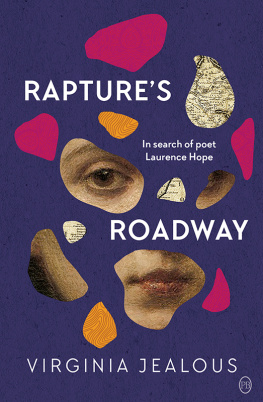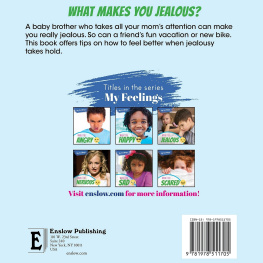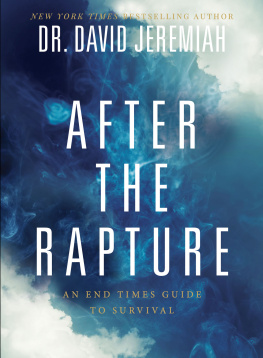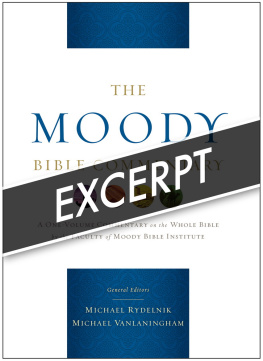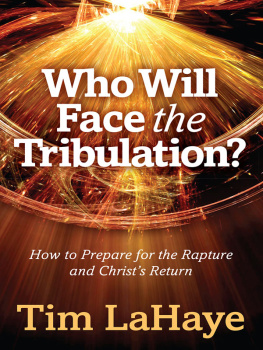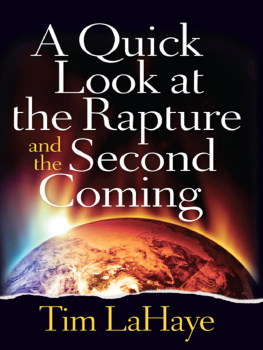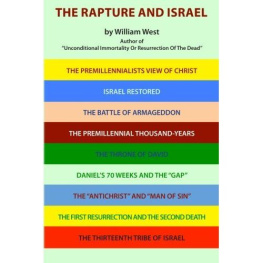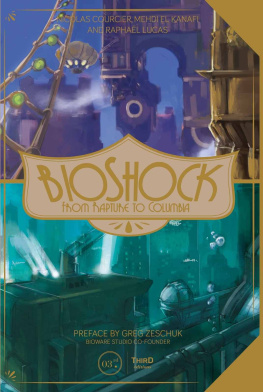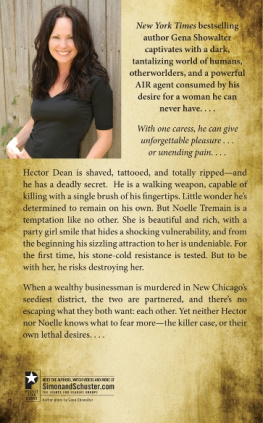Virginia Jealous - Rapture’s Roadway
Here you can read online Virginia Jealous - Rapture’s Roadway full text of the book (entire story) in english for free. Download pdf and epub, get meaning, cover and reviews about this ebook. year: 2019, publisher: Ventura Press, genre: Non-fiction / History. Description of the work, (preface) as well as reviews are available. Best literature library LitArk.com created for fans of good reading and offers a wide selection of genres:
Romance novel
Science fiction
Adventure
Detective
Science
History
Home and family
Prose
Art
Politics
Computer
Non-fiction
Religion
Business
Children
Humor
Choose a favorite category and find really read worthwhile books. Enjoy immersion in the world of imagination, feel the emotions of the characters or learn something new for yourself, make an fascinating discovery.
- Book:Rapture’s Roadway
- Author:
- Publisher:Ventura Press
- Genre:
- Year:2019
- Rating:3 / 5
- Favourites:Add to favourites
- Your mark:
- 60
- 1
- 2
- 3
- 4
- 5
Rapture’s Roadway: summary, description and annotation
We offer to read an annotation, description, summary or preface (depends on what the author of the book "Rapture’s Roadway" wrote himself). If you haven't found the necessary information about the book — write in the comments, we will try to find it.
Rapture’s Roadway — read online for free the complete book (whole text) full work
Below is the text of the book, divided by pages. System saving the place of the last page read, allows you to conveniently read the book "Rapture’s Roadway" online for free, without having to search again every time where you left off. Put a bookmark, and you can go to the page where you finished reading at any time.
Font size:
Interval:
Bookmark:
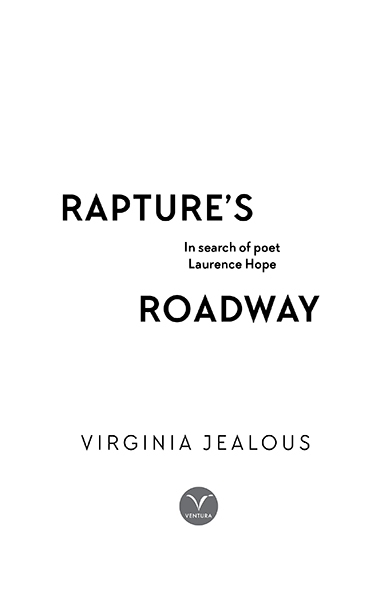
First published in 2019 by Ventura Press
PO Box 780, Edgecliff NSW 2027 Australia
www.venturapress.com.au
Copyright Virginia Jealous 2019
All rights reserved. No part of this book may be reproduced or transmitted in any form or by any means, electronic or mechanical, including photocopying, recording or by any other information storage retrieval system, without prior permission in writing from the publisher.
Every effort has been made to trace the original source material contained in this book. Where the attempt has been unsuccessful, the publishers would be pleased to hear from the author or publisher to rectify any omission.
National Library of Australia Cataloguing-in-Publication entry:
ISBN: 9781925384611 (paperback)
ISBN: 9781925384628 (ebook)
Cover and internal design: Alissa Dinallo
i. m. Helen Grant Ross-Jealous, 19302018
Pale hands I loved beside the Shalimar,
Where are you now? Who lies beneath your spell!
Whom do you lead on Raptures roadway, far,
Before you agonise them in farewell?
from Kashmiri Song by Laurence Hope
CONTENTS
Dead poets society; That song
Looking for Laurence Hope; On the shelf; Breaking boundaries; Sidetracked in Shimla; Moving through mountains; Found in Feroke; Beauty and the beholder
Suicide is painful; Earth to earth; Recovery; Past into present; Bookmarks
His mothers son; Life and death in letters; The mystery of the missing paperwork; Skeletons and closets; Their fathers daughters; Lost boys; Inheritance
China Girl; Pale hands; Peak hour; A spirited response; Mhow and the maybe-movie; Laurence in Australia
Widening horizons; The other Violet; Outdoors in Indore; The moving finger; Mhow daze; Past is present; Plains speaking; Staying on; What lies beneath; The ever-elusive Nicks; Whats in a name?; Reading between the lines; Waler tales; Coming to the end
London, 2017: Looking back; Image and imagination Edinburgh, 2017: Paper trail; Lost in space; Drawn in Majorca, 2017: To everything a season; Reviewing the situation Australia, 2017: Things taken home
Chapter 1
IN THE BEGINNING
DEAD POETS SOCIETY
He was sixty, and shed already been dead for eighty years when he became obsessed with her.
My father, in his retirement, reinvented himself as a bookseller, running Books About India from his study in Yorkshire. Its unclear if the bookshop was cause or result of his late-blooming obsession with Laurence Hope, but for the last twenty years of his life Hopes presence was palpable in the house. He collected many and varied editions of the poems and related paintings; made regular trips to India tracing the poets life there; entered into a voluminous correspondence with booksellers, readers and historians; and edited an idiosyncratic biannual Laurence Hope newsletter for a small but stalwart group of fans worldwide. He also tended towards regular outbursts of her poetry aloud.
He loved the reveal Yes, really. Her poetry! and would tell the story of how, in the early decades of the twentieth century, she was as famous and infamous as a writer could wish to be. Today, her three small volumes of verse are most likely to be found stored in attics around the world or on the back shelves of second-hand booksellers, most of whom wont recognise her name. My fathers mission became to bring her back from obscurity and by doing so he took himself into unfamiliar territory. This was a place hed always enjoyed: a new landscape inhabited by strangers who might become friends.
My father had a short biography of Laurence Hope down pat. She was born Adela Florence Cory in 1865, spent her childhood in England, and in her teens moved to India, where her father was editor of The Civil and Military Gazette in Lahore. Her friends and family knew her as Violet, for the colour of her eyes; after her marriage to high-ranking Bombay Army officer Malcolm Hassels Nicolson she was widely known as Violet Nicolson. We knew her, familiarly, as LH and her husband as the General.
Laurence Hopes first collection of poems, The Garden of Kama, was published in 1901. It bears startling witness to the years that LH spent so the story goes disguised as a Pathan manservant, accompanying her husband on campaign on the North-West Frontier and, dressed somewhat more conservatively, at the military cantonment of Mhow, in central India. Described as translations arranged in verse, her poems depict an exotic, eroticised colonial India where love is always passionate, usually forbidden, often unrequited and occasionally sadomasochistic. This was, to put it mildly, an unusual subject for an English memsahib, especially one who was also the wife of a commanding officer: using Laurence Hope, a mans name, allowed her freedom to write as she chose.
The narrators of LHs verse include slave girls and princesses, colonial masters, native soldiers and villagers, lovers-turned-murderers. Several cracking poems have stood the test of time but many appear fantastical and absurd to twenty-first century readers. Take the premise of Afridi Love, where a betrayed husbands response is to kill his wifes lover, then tie his wife to a bed and have his way with her before (and also quite possibly after) slitting her throat:
When I have slowly drawn my knife across you,
Taking my pleasure as I see you swoon,
I shall sleep sound, worn out by loves last fervour
Its heady stuff that set well-corseted Edwardian bosoms heaving across the Empire and beyond America, too, embraced LH.
Mr Hope was favourably reviewed, which led to some speedy back-pedalling by the literary establishment when, in 1903, on publication of a second collection Stars of the Desert LH was outed publicly as a woman. Her friends in literary circles already knew this. In his 1901 notebook Somerset Maugham described the gossip, adding, This note gave me the idea for a story which I wrote forty years later. It is called The Colonels Lady. Studio portraits of LH were taken in 1903 in London by society photographer George Beresford who, a year earlier, had taken the now-famous series of a young Virginia Woolf in profile. Those of LH show her wearing oriental drapery and bracelets and looking directly at the camera: her gaze says dont mess with me.
This image was used as a frontispiece in subsequent editions of her poetry to prove her identity and a framed copy of it oversees the desk where I write. Perhaps its this photo that caught my fathers eye. In his notes for an (unpublished) essay, in a section titled Was She Beautiful?, he wrote about LHs magnificent eyes and quite beautiful mouth; he comments that she looked passionate.
My father always had an eye for women. Photographs from the 1930s and 1940s show his transition from charming child to fit teenage rugby player, and by the 1950s he is an absurdly handsome army officer, snapped in uniform or tropical whites on overseas postings. Some of these photos show him with his first wife my stylish mother, Mary. They are a golden couple, married in 1952, smiling out of an evening at the club in 1950s Hong Kong or at embassy cocktail parties in 1960s Moscow. Theres a story that my mother charmed Khrushchev one evening, danced with him while my father, from a window in a back room, took covert photos of armoured vehicles massed in a rear courtyard. Several of his postings were officially unaccompanied but apparently he was rarely actually unaccompanied for long. Gossip followed him home and by the late 1960s my parents were divorced and my father had met Helen, the woman he later married and lived with for the rest of his life.
Next pageFont size:
Interval:
Bookmark:
Similar books «Rapture’s Roadway»
Look at similar books to Rapture’s Roadway. We have selected literature similar in name and meaning in the hope of providing readers with more options to find new, interesting, not yet read works.
Discussion, reviews of the book Rapture’s Roadway and just readers' own opinions. Leave your comments, write what you think about the work, its meaning or the main characters. Specify what exactly you liked and what you didn't like, and why you think so.

